YAPC::Asia 2013
Last week there was another YAPC::Asia at Keio University Hiyoshi Campus. Here’s a quick review as both recurring speaker and previous organizer of the conference myself.
Venue & Organization
The home of YAPC::Asia used to be at TITech, but last year it departed from there and relocated to University of Tokyo Hongo campus. While the venue was brand new and clean, there were not many places to sit and was difficult to talk to people on the hallway, and access to restaurants, pubs etc. was relatively difficult.
This year they relocated again to Hiyoshi. While it might be a little far for people living in the central/east/north side of Tokyo, for me personally it is much easier to access, since I regularly stay at Hotel in Musashi Kosugi.
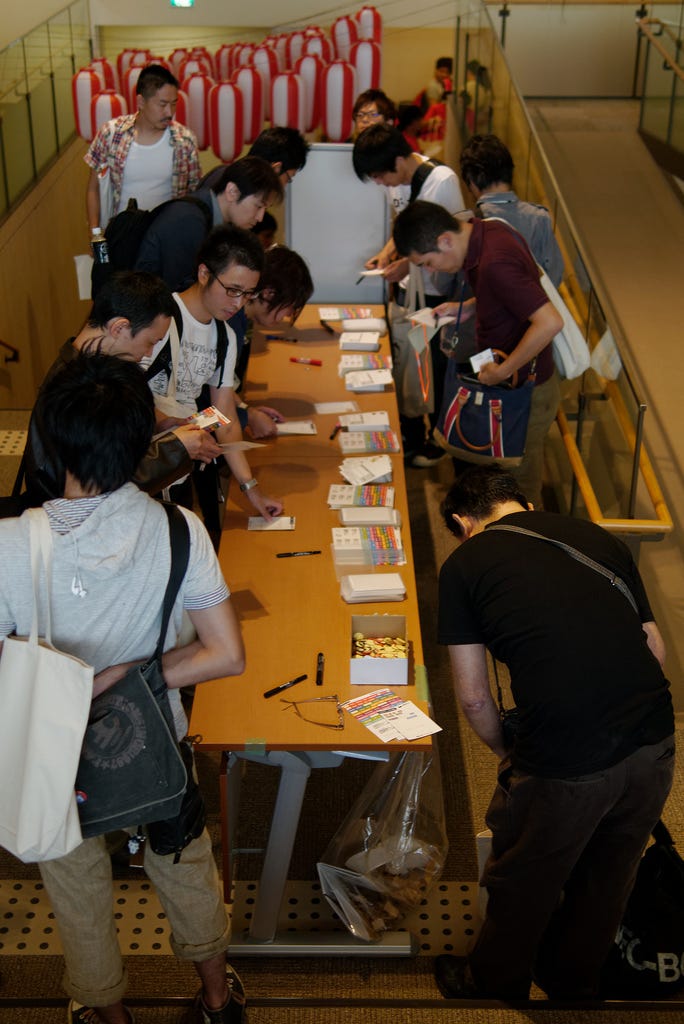
I loved the venue. It is a new building, with 4 conference rooms available on the same floor. The main room has plenty of power available on every seat, and custom built Wi-Fi was very reliable.
As a bonus point, on the first floor was a pub called HUB. While it wasn’t big enough to contain all of YAPC attendees after the conference, it was a go-to place for us hallway track lovers to get beer during the talks.
For the lunch on Day 1 we walked to the cafeteria, and had lunch with a bunch of regular students. It’s very cheap and yet still satisfactory (because it’s for students, who are more hungry than the most of us).

Sponsorships
I liked that this year, the sponsorship opportunity has been utilized as much as one could imagine.
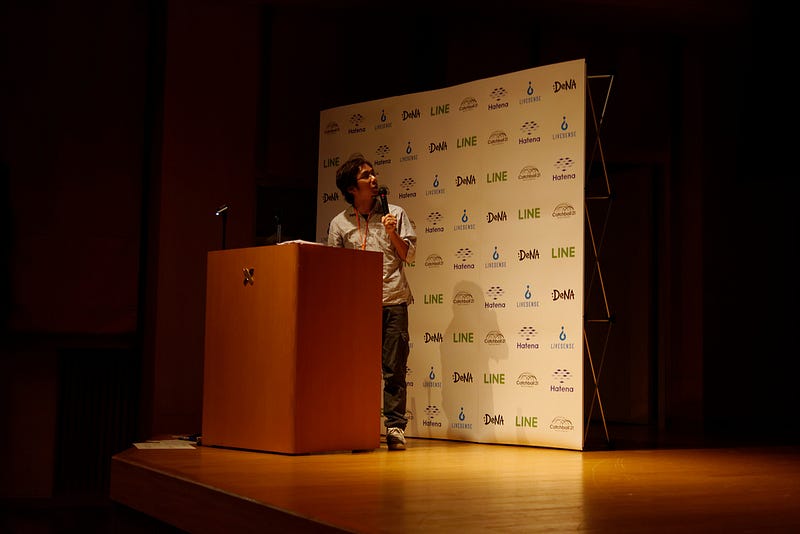
There are back boards with sponsor logos behind the speakers (kind of like a press conference/interviews), videos playing during the talks, free lunch/dinner provided with the presentation from sponsors, etc.
It is beyond one’s imagination on how much it costs to organize a conference for more than 1000 attendees, and the organizers handled it very well.
Hallway Tracks
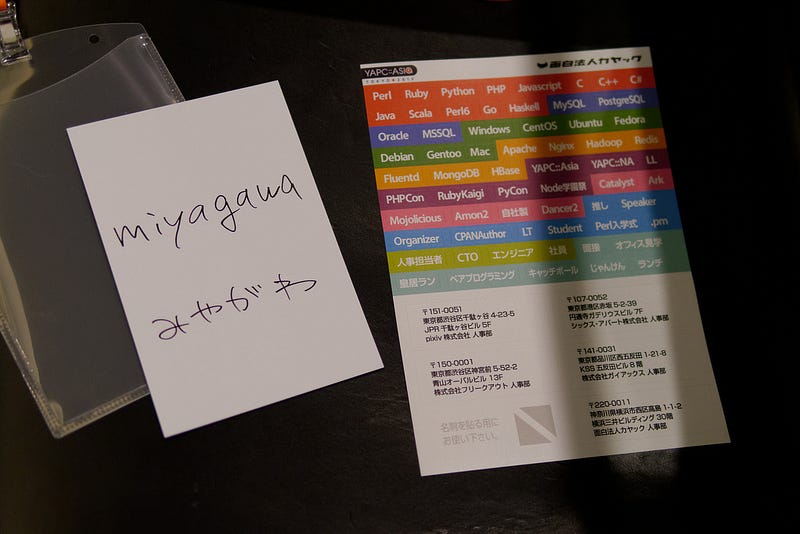
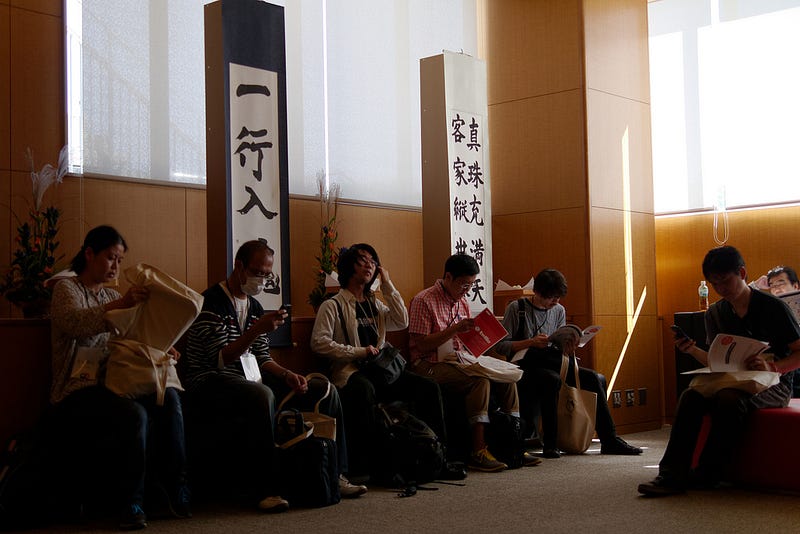
In my podcast tokuhirom, lestrrat and I talked a couple of times to mention that it’s more important to talk to people at YAPC::Asia than attending all of the talks.
I liked that there were some badges you can attach to your nameplates (taken from OSCON/YAPC::NA), and that there was a BOF area. To be honest though, the BOF area wasn’t used as efficient as i could hope. There was just a few people giving presentations, and the rest were working on their laptops.
My suggestion: put up a whiteboard with 30 minute time slots attached, and anyone can write down their names to hold an impromptu meetup there.
Talks
At last but not least, there were bunch of talks. As a speaker who writes slides as the conference goes (CDD FTW), i didn’t take my time to watch many slides, but some of the talks were impressive, especially the one given by goccy on his perl compiler and perlmotion. I missed the last half of the talk because it was against me, but it’s always refreshing to see new faces coming to conference and giving presentations about the perspective that has never been given by the regulars.
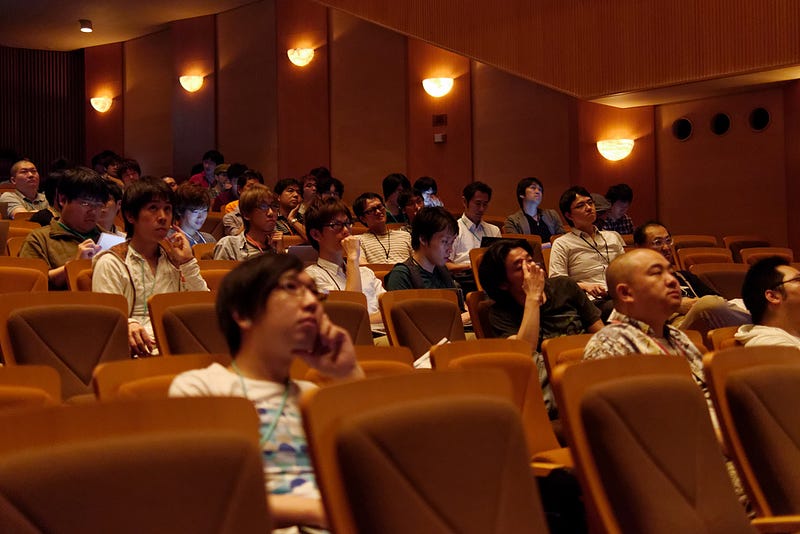
There’s always been “trends” in the past YAPCs — Perl 6, Plack/PSGI, PaaS, Scaling Web services, Testing etc. This year, it was mostly:
- Operating large scale Web Services
- Testing and Continuous Delivery
- Github style development workflow
- Now and the future of Perl 5 First and second has been regular topic at YAPC::Asia, and that’s one of the reasons it attracts attendees from the tech community at large, outside just Perl.
What feels kind of new this year was the last topic, about the Perl 5. YAPC::Asia is usually about what people do using Perl — Perl is and has always been a tool to accomplish a goal. This year, there were several talks that discuss Perl 5, the language itself. (which btw I feel is more regular in YAPCs elsewhere)
And I find that fascinating. Especially the one by goccy mentioned above, and tokuhirom giving his cool hack to transpile Perl 6 code to perl 5 (a la CoffeeScript) with his own compilers (pvip and seis). Reine Urban also gave his talk about his VM p2, and of course, rjbs talked about perl 5.20 (and beyond) on his keynote.
Languages and Future YAPCs
rjbs wrote:
On both of my trips there, I’ve been an invited speaker, and felt very welcome… but feeling welcome isn’t the same as feeling like a part of things. The language barrier is very difficult to get past. It’s frustrating, because you find yourself in a room full of brilliant, funny, interesting people, but you can’t quite participate.This is precisely what I’ve been feeling at every YAPC::Asia, growing in more recent events.
There might not be anyone to blame — YAPC::Asia has just grown out of hands, quickly from “Perl stars from overseas, and hard-core perl hackers come together to meet” to “Geeks festival to talk about anything about programming, testing to Web stuff”.
YAPC::Asia 2013 didn’t have 1100 attendees because it was the conference about Perl and has guests from overseas — it did because it’s YAPC::Asia, that’s meant to be fun and big regardless of the guests.
Some people might have said that YAPC with the size of 100 attendees was better than the current YAPC. That’s a total nonsense. It’s obvious that a conference with more attention is million times better than less. Nobody in the straight face would have say that Perl is dead, when the conference for Perl attracts 1000 people every year.
The future risk for YAPC::Asia is not the size of attendees shrinking, but the majority of talks not talking about Perl at all, and perl gets irrelevant. That’s something you should be afraid of, and exactly why I liked that there were many talks about Perl itself, not just using Perl as a tool.
I appreciate and respect the organizer wholeheartedly for the past 5 years of keeping the conference rolling, and understand their personal decision to leave it. While it was much smaller then what it is, I took the same decision 6 years ago :) — glad it was picked up by the right people.
Well, the Japanese Perl community — or, rather, the community in Japan that made YAPC::Asia happen — has some crossover with the community that makes YAPC::NA happen, but there are large disjunct segments, and they’re solving problems differently, and it’s ridiculous to imagine that we can’t learn from each other. Even if it wasn’t self-evident, it was evident in the presentations that were given.Can’t agree more on this. 6 years ago, there were more talks from guests, and there were so many efforts to get the talk translated. I know volunteers still did their work this year, and kudos to that, but it seemed talks from guests were relatively unpopular when there were talks given by Japanese speakers. Again I’m not going to blame anyone for this, nor it might not necessarily a bad thing itself.
I don’t know if there’ll be YAPC::Asia 2014. It’s sad to imagine that there isn’t one, but it will be so difficult for anyone to just stand up and keep the conference of this size going — not something that can be done as a personal hobby.
I would imagine there will be much smaller regional YAPCs and Perl workshops. That’s what happened in RubyKaigi as well, when the organizer decided to take a break, then rebooted it with a much smaller size (partly by increasing the price of the ticket).
Hope to come back and meet my friends in late September, the best season to come to Japan, either at YAPC::Asia or YAPC::Tokyo or whatever. I will definitely come back.